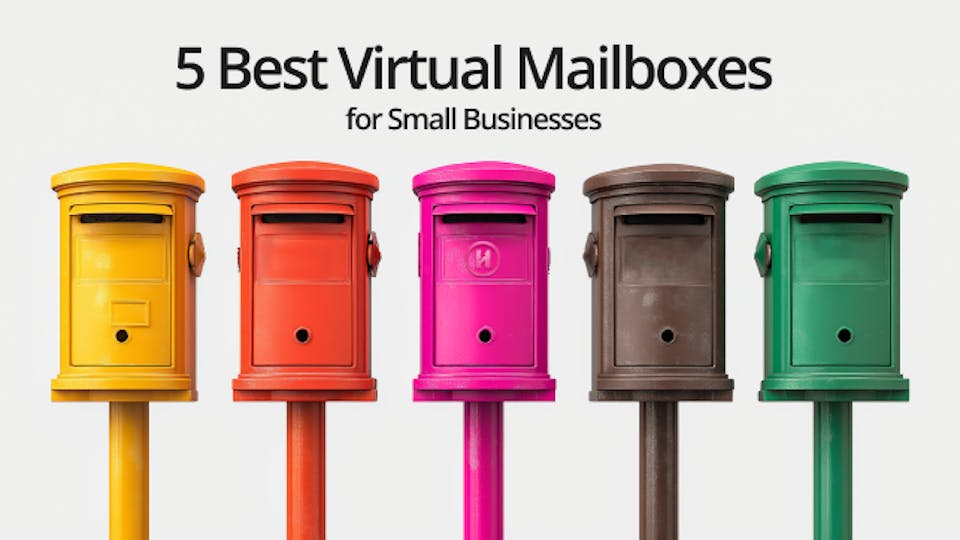30 June, 2022
How to Register as a Sole Trader in The UK: Key Details You Need to Know
Table of Contents
Many people setting up as their own boss will choose to work from home initially, so registering a sole trader business is often done using a virtual business address. As a leading UK provider of flexible virtual office solutions, we're frequently asked 'how do I register as a sole trader?'.

In this handy guide, we'll cover all the key basics of how to register a sole trader company in the UK, including a quick overview of some potential alternative approaches during your initial company formation and business registration with Companies House and/or HMRC. While you're at it, check out our options for a cheap virtual office in the UK.
Who Should Register a Sole Trader Company?
For new business startups where you'll effectively be working on a self-employed basis, the simplest approach is often to register a sole trader company. For small operations (commonly single-person, although this isn't necessarily always the case), establishing yourself as a sole trader offers a good degree of flexibility and control.
One key advantage of this setup is that, when you register as a sole trader, Companies House does not need to log and list your business (or your company financial statements) as part of the publicly accessible UK record. You'll need to submit all your relevant financial paperwork to HMRC on an annual basis in the form of a Self Assessment tax return, but this isn't part of the public record - more on this later.
Sole Trader vs Self-Employed: What's the Difference?
Before you proceed with any form of new business formation, you should be clear on the precise definition of a sole trader, and the distinction between sole trader and other forms of company registration.
It's especially important to understand that, while all sole traders are essentially self-employed, not all self-employed people are technically sole traders. In short:
If you're working for yourself and you're the only owner of your business, then you're technically a sole trader. This doesn't necessarily mean you can't employ anyone else, but you do need to be the sole owner and shareholder at all times.
If you're acting as a limited company, operating under an umbrella company (for example while working as a contractor), or you're in a business partnership with someone else, then you're not operating as a sole trader even if you do work entirely for yourself.
How Should You Pay Taxes When Setting Up As a Sole Trader?
If you haven't filed a tax return before as a self-employed trader, you need to register as a sole trader and receive your UTR (Unique Taxpayer Reference). More information on how to register a sole trader business is available here and in the later sections of this article.
In the simplest terms, you'll be paying income tax, just like employed individuals. The percentage depends on where your income falls in the bracket structure. £50,271 to £150,000 is taxed at 40%. And income of over £150,000 is taxed at 45%. This information is for England and Wales for the tax year 2021-2022, so if you're in Scotland, search for updated information on the government website.
The non-taxable bracket can be increased if you claim a marriage allowance or a blind person's allowance when setting up a sole trader business.
Benefits vs Drawbacks of Registering As a Sole Trader
Understandably, most people like to weigh up potential pros and cons when you register as a sole trader in the UK. There are both advantages and disadvantages to choosing this type of company formation, depending on the specifics of your business and personal circumstances. Let's explore both angles briefly.
Sole Trader - The Pros
Fast, easy setup - registration is simple, with less paperwork to worry about.
You don't need to formally register your business name with Companies House, as limited companies do. This means you won't need to submit annual forms like the Confirmation Statement, a time-consuming process in which you provide an obligatory overview of the current management and running of your business, and which costs a fee to file.
All trading profits go directly to you.
Limited companies are obliged to distribute profits among all their shareholders, but as a sole trader you'll be the only financial beneficiary (after any relevant deductions for taxes payable, employee wages, and so on). Furthermore, any material assets used in the running of your business will belong directly and personally to you, rather than to 'the company'.
Increased flexibility to make changes as you grow.
As a sole trader, it's pretty easy to switch to being registered as a limited company later on if you feel you need to. On the other hand, trying to shift away from being a limited company and back to being a sole trader is a far more complex and convoluted process. If you're still figuring out exactly how the self-employment world might work for you and your business, registering as a sole trader is a convenient place to start.
Enhanced privacy - no obligation to share personal or financial details publicly.
Because the ins and outs of your balance sheet don't need to be submitted through Companies House, they don't appear on the public record; nobody except you and HMRC will have access to any of that potentially sensitive information. You can also operate privately from home, or another remote location, using a virtual business address and a suitable virtual MailRoom client or mail forwarding service.
More straightforward accounting and financial filing.
Unlike limited companies, you don't need to factor in an annual corporation tax and balance sheet submission - instead, you'll just log invoices, expenses and overall profits in your Self Assessment tax return to HMRC. (If you use an accountant to perform any of these services, this will significantly reduce their annual charges.)
Sole Trader - The Cons
Personal liability sits with you as a sole trader.
Other types of company are often classed as a separate legal entity from the owner(s) themselves, meaning debts and liabilities aren't necessarily tethered entirely to an individual's personal finances. This isn't the case if you're a sole trader. Business arrears will need to be paid off using your own assets if that's all you have to put up against them, and such liabilities are technically unlimited.
Fewer tax benefits than limited companies.
You'll typically be taxed a more severe flat rate on all profits than a limited company would, and you're unable to draw company dividends as a lower-rate income booster. You can still claim deductions and allowances for certain types of business expenses, but on the whole it's a far more limited range of tax options for sole traders. Check out our company formation services to set up your limited company today.
Some clients and customers aren't as accepting of sole traders.
You may find that, on occasion, you struggle to compete with limited companies due to a perceived lack of security, credibility or prestige as a sole trader. Some other client companies may be hesitant about working with you as a sole trader in a contracting scenario, due to heightened wariness around the IR35' employee for tax purposes' rules.
Register As a Sole Trader in the UK
When it comes to knowing precisely how to register as a sole trader, it couldn't be much more straightforward in terms of the minimal paperwork required. You'll need to inform HMRC that you're switching to Self Assessment tax status and fill in a tax return annually, with a personal allowance of £12,500 before taxable income kicks in.
You'll also need to register for VAT if you have an annual turnover of £85k or more, and a National Insurance number in the UK if you're registering from abroad with approval to live and work here. Again, you won't need to register your trading or business name with Companies House, so you can call your business anything you like (provided it doesn't fall foul of anything on the government's trade mark register).
Business Records You Should Keep As a Sole Trader
Along with learning how to set up as a sole trader, you need to know how to keep your business functioning and compliant with the law. For this, you'll need records of:
- Your sales and profits;
- Business expenses;
- Personal income;
- VAT records
- PAYE records
- Any grants.
Records, or types of proof, cover a broad category of documents, including receipts, invoices, bank statements, chequebook stubs, bank slips, etc.
In addition to standard records, your tax return must also include proof of:
- Debts owed to you;
- Your personal debts;
- Invoices that you haven't paid yet;
- The value of stock (if applicable)
- Your year-end financial statements
- Investments in the business.
Naming Your Sole Trader Business
As mentioned, there are rules for what words and expressions are available for a business name (check them out here). For example, it cannot contain Limited (Ltd), Limited Liability Partnership (LLP), or Public limited company (Plc) because these phrases portray the status of their business incorrectly.
When you register your business name as a sole trader, bear in mind that the name will contain and/or be used alongside your:
- Business letters;
- Emails;
- Invoices and receipts;
- Orders for goods or services.
You must also include a self-employed business address so that the document can be served to that address. Discuss your solutions with a Hoxton Mix specialist to operate a business in the UK.
Can You Employ People As a Sole Trader or Not?
Yes. "Sole trader" doesn't mean you absolutely have to work solo; it means that you're not operating under anyone else's business. The only thing that is strictly prohibited is employing yourself in your own company.
You can hire employees on different types of contracts: permanent, part-time, or freelance. The choice is yours. Be prepared for a long journey of being an employer that starts with registering with HMRC as an employer and setting up on PAYE. This will help you deduct income tax and insurance from employee wages in the future.
How Long Does It Take to Register As a Sole Trader?
Normally, registration with HMRC takes 10 working days. If you set up a sole trader company in the UK while you're abroad, the process will take 21 days. If you want to check the status, log on to your Government Gateway account and see if the activation code has been posted.
Make sure to start the process as early as possible. If you miss the deadline after the end of the tax, you will most likely be fined.
For more detail on our company formation services with full London-based virtual office solutions for your new business, contact a member of The Hoxton Mix team today.
FAQ
How do I register as a sole trader?
First, switch to Self Assessment tax status and inform HMRC by completing an online form. You will also need to receive your Unique Taxpayer Reference through the government portal and register for VAT (if your turnover exceeds £85,000). If your income is over the £12,500 allowance, you will need to pay tax.
How long does it take to register as a sole trader?
You can register a sole trader company in the UK within 10 working days if you're in the country or 21 working days if you're abroad. The process itself takes minutes, so you mostly need to account for the waiting period. Company name registration is usually done within a day.
Can sole traders use a virtual office address?
Yes, you can definitely use a sole trader virtual address instead of your real physical address. A virtual office in London is a cheaper and more flexible option than traditional office space. We talk about it in more depth in our article about PO box alternatives, so you're welcome to check this one out.
How much does sole trader registration cost?
Becoming a sole trader involves no cost when you register via HMRC. But when you register your business name, there will be some expenses. If you go with Companies House, the registration will cost £12 when you do it online and £40 when you apply by post.
What information do sole traders need to provide during registration?
You'll be asked to provide your: name; date of birth; NI number (National Insurance, can be retrieved online); postal address (also an option with a virtual office); telephone number; email. Enter this information in the corresponding field in the online form. Also, you'll need to specify the start date and the type of work you do.
Are 'sole trader' and 'self-employed' the same thing?
While both terms are used interchangeably, there is a subtle difference. A sole trader is self-employed, but not all self-employed people are sole traders.
Are sole traders on Companies House?
UK sole traders don't have to register with Companies House, which is responsible for incorporating and dissolving companies and maintaining their information. Companies House deals only with limited companies, like private companies limited by shares, private companies limited by guarantee, and public limited companies.
Hand-picked related articles

London
Virtual Office
Mail Management
![Starting a Business While Employed in the UK [All Considerations]](https://images.prismic.io/hoxton-mix/ODg5YzBjODUtNTY3My00NDIxLWI1YWMtNTRlNWVlZTE5NTJm_eb77e98b-ff83-430a-aba0-3633c7944c11_running-your-own-business-while-still-employed.jpg?auto=compress%25format&rect=120%250%25720%25480&w=960&h=640)




